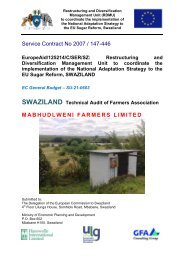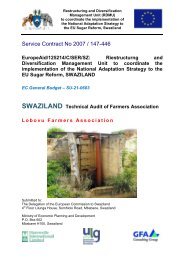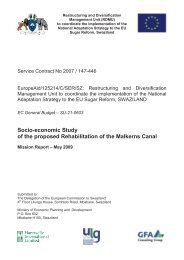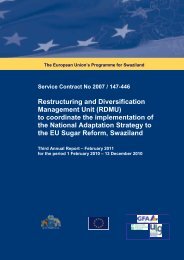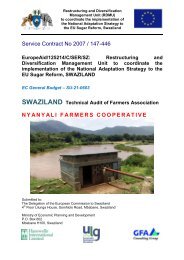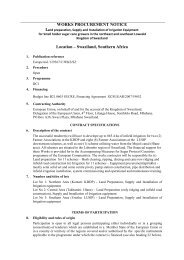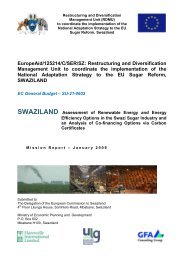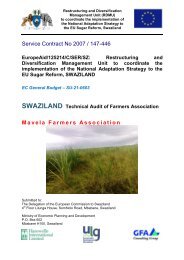Service Contract No 2007 / 147-446 Strategic ... - Swaziland
Service Contract No 2007 / 147-446 Strategic ... - Swaziland
Service Contract No 2007 / 147-446 Strategic ... - Swaziland
- No tags were found...
You also want an ePaper? Increase the reach of your titles
YUMPU automatically turns print PDFs into web optimized ePapers that Google loves.
ipening period. Presence of pests and changes in their patterns will also change withtemperature.In a recent study on the impacts of climate change on sugar cane in <strong>Swaziland</strong> 12 , modelshave suggested an increase in crop water requirement of between 11% and 14%. Withclimate change, the combined effect of reduced summer rainfall and increasedevapotranspiration rates, results in an increase in average irrigation need of 22–26%.Figure 15:Stunted sugar cane due to insufficient waterIn the case of <strong>Swaziland</strong>, three main changes are expected: (1) increased flooding in thesummer period; (2) increased probability of drought in winter; and (3) moderate decrease inrun-off. In addition, mean temperatures are expected to increase 1ºC by 2050 and 2ºC by2100. Down-scaled studies into the effects of climate change on national water resourcesare, however, very limited, but those that exist point towards a negative impact on wateravailability (Matondo et al, 2004).<strong>Swaziland</strong> has no policy or strategy to address the myriad of issues that arise as a result of achanging climate but it has prepared several sectoral reports on possible effects andadaptive strategies. The country is about to prepare its second National Communication tothe United Nations Framework Convention on Climate Change (UNFCCC) in whichinformation will be included on: (a) national inventory of anthropogenic emissions by sourcesand removal by sinks of all greenhouse gases not controlled by the Montreal Protocol; (b) ageneral description of steps taken or envisaged to implement the Convention; and (c) anyother information considered relevant to the achievement of the objective of the Convention.Informing the second National Communication are several sectoral reports prepared byTechnical Working Groups which are unavailable at the time of writing.With the sugar industry so dependent upon water for producing cane and processing it, theeffect of any reduction in water availability must be a major concern. The paucity ofinformation on the possible impacts and time frames is resulting in a business-as-usualapproach to their water management strategies. Stakeholder consultations have identifiedclimate change effects on water resources as a high priority issue. Several stakeholders12 J.W. Knox, J.A. Rodríguez Díaz, D.J. Nixon, M. Mkhwanazi, 2010. A preliminary assessment of climate change impactson sugarcane in <strong>Swaziland</strong>. Agricultural Systems 103 (2010) 63–72RDMU (<strong>Strategic</strong> Environmental Assessment of the National Adaptation Strategy) - Page 47



